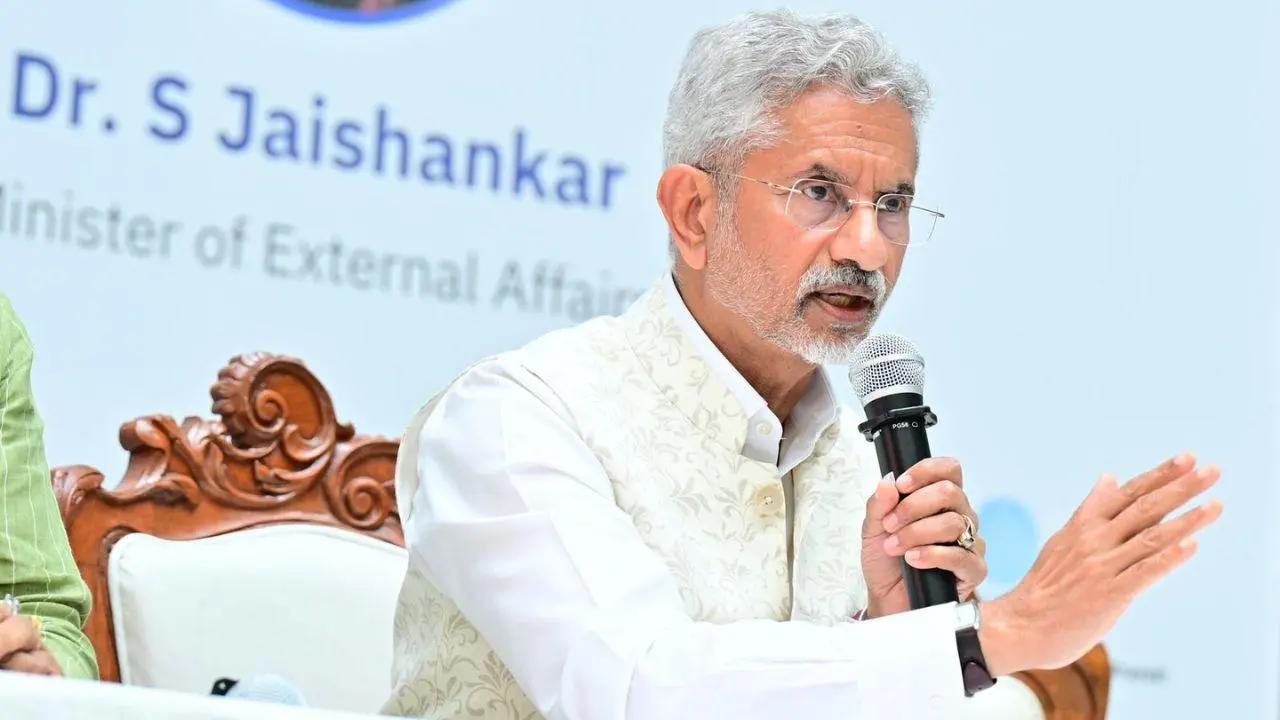The MEA, in a statement, said that Canadian Prime Minister Justin Trudeau made certain allegations in September 2023 regarding India's involvement in the killing of Khalistani terrorist Hardeep Singh Nijjar

S. Jaishankar, Minister of External Affairs of India. (Pic/Shadab Khan)
India on Monday "strongly" rejected a diplomatic communication from Canada suggesting that the Indian High Commissioner and other diplomats were "persons of interest" in an investigation and termed it as "preposterous imputations" and part of the political agenda of the Justin Trudeau government, reported news agency ANI.
The Ministry of External Affairs (MEA) stated in a statement that Canadian Prime Minister Justin Trudeau made certain allegations in September 2023 regarding India's involvement in the killing of Khalistani terrorist Hardeep Singh Nijjar.
However, the Canadian government has not shared a single piece of evidence with the Indian government despite many requests from them, the statement said.
The MEA said, "We have received a diplomatic communication from Canada yesterday suggesting that the Indian High Commissioner and other diplomats are 'persons of interest' in a matter related to an investigation in that country. The Government of India strongly rejects these preposterous imputations and ascribes them to the political agenda of the Trudeau Government that is centred around vote bank politics."
"Since Prime Minister Trudeau made certain allegations in September 2023, the Canadian Government has not shared a shred of evidence with the Government of India, despite many requests from our side. This latest step follows interactions that have again witnessed assertions without any facts. This leaves little doubt that on the pretext of an investigation, there is a deliberate strategy of smearing India for political gains," it said.
The MEA pointed out that Trudeau's government has a history of hostility towards India, citing past actions such as including individuals who have openly associated with an extremist and separatist agenda regarding India.
Recalling Trudeau's past actions, MEA stated, "Prime Minister Trudeau's hostility to India has long been in evidence. In 2018, his visit to India, which was aimed at currying favour with a vote bank, rebounded to his discomfort. His Cabinet has included individuals who have openly associated with an extremist and separatist agenda regarding India.”
The statement noted that the Canadian PM's "naked interference" in Indian internal politics in December 2020 showed how far he was ready to go in this regard.
"That his Government was dependent on a political party, whose leader openly espouses a separatist ideology vis-a-vis India, only aggravated matters. Under criticism for turning a blind eye to foreign interference in Canadian politics, his Government has deliberately brought in India in an attempt to mitigate the damage,” it said.
The statement went on to add that the Trudeau Government has constantly looked for narrow political gains.
This latest development targeting Indian diplomats is now the next step in that direction. It is no coincidence that it takes place as Prime Minister Trudeau is to depose before a Commission on foreign interference. It also serves the anti-India separatist agenda that the Trudeau Government has constantly pandered to for narrow political gains."
The MEA also expressed concerns about the Canadian government's tolerance for extremist elements that harass Indian diplomats and community leaders in Canada. It highlighted instances of harassment and intimidation justified as freedom of speech.
"To that end, the Trudeau Government has consciously provided space to violent extremists and terrorists to harass, threaten and intimidate Indian diplomats and community leaders in Canada. This has included death threats to them and to Indian leaders. All these activities have been justified in the name of freedom of speech. Some individuals who have entered Canada illegally have been fast-tracked for citizenship. Multiple extradition requests from the Government of India in respect of terrorists and organised crime leaders living in Canada have been disregarded," MEA said.
The statement defended High Commissioner Sanjay Kumar Verma, noting his extensive diplomatic career spanning 36 years and dismissing the allegations against him as ludicrous.
"High Commissioner Sanjay Kumar Verma is India's senior most serving diplomat with a distinguished career spanning 36 years. He has been Ambassador in Japan and Sudan, while also serving in Italy, Turkiye, Vietnam and China. The aspersions cast on him by the Government of Canada are ludicrous and deserve to be treated with contempt."
The MEA said that the Indian government has taken “cognizance” of the activities of the Canadian High Commission in India that serve the political agenda of the current government.
It further said, "This led to the implementation of the principle of reciprocity in regard to diplomatic representation. India now reserves the right to take further steps in response to these latest efforts of the Canadian Government to concoct allegations against Indian diplomats," as reported by ANI.
Read the full statement here:
Our response to diplomatic communication from Canada:https://t.co/TepgpVVPxp
— Randhir Jaiswal (@MEAIndia) October 14, 2024
The ties between India and Canada soured when Trudeau alleged in the Canadian Parliament last year that he had "credible allegations" of India's hand in the killing of Khalistani terrorist Hardeep Singh Nijjar.
India has denied all the allegations, calling them "absurd" and "motivated" and has accused Canada of giving space to extremist and anti-India elements in their country, stated ANI.
India’s National Investigation Agency had designated Nijjar as a terrorist in 2020. Nijjar was shot and killed outside a Gurdwara in Surrey in June last year.
(With inputs from ANI)
 Subscribe today by clicking the link and stay updated with the latest news!" Click here!
Subscribe today by clicking the link and stay updated with the latest news!" Click here!










